Nematodes pose a conundrum to farmers. The worm-like microscopic creatures are everywhere. Some are parasitic, infecting plants and destroying crops — but others actually attack insect pests. The ability to target the “bad” while leaving the “good” unharmed would be a boon for agricultural production.
That’s the mission at Pheronym, a Davis-based agriculture biotech startup cofounded by Fatma Kaplan, who has a Ph.D. in plant molecular and cellular biology, and postdoctoral training in natural product chemistry with a focus on isolating biologically active compounds. Pheronym has created two nontoxic solutions that use pheromones — chemical substances produced by animals — to control nematode behavior.
Kaplan, who is the company’s CEO, explains that typically a farmer may order commercial nematodes (the beneficial kind) to help them kill insect pests in 24-48 hours. But after about a week, they lose the pheromone signal to find insects, so stop hunting as vigorously. It might take that long for farmers to receive commercial nematodes, due to packaging and shipment time. That means these nematodes may have already lost their “hunting” signal before they start hunting, Kaplan says.
NemaStim, Pheronym’s first product, is an additive to commercially available nematodes that essentially keeps good nematodes “in the mood” to keep searching and destroying pests. A second product called PheroCoat is in the development stage, and its purpose is to confuse parasitic nematodes and direct them away from healthy roots of plants. (PheroCoat is expected to be commercially available to farmers in 2023.)
Annually, farmers around the world lose about 20 percent of their crops to insects and another 12 percent to plant-parasitic nematodes, losses worth $620 billion, Kaplan says. For farmers and gardeners, she adds, pheromone-based solutions can have a big impact as an alternative to chemical pesticides, which has a $66 billion market.
“Farmers have to control pests to grow enough food to feed the world, and consumers demand safe, eco-friendly solutions for the food they eat,” says Kaplan, who comes from a farming family. “Pheromone-based solutions provide exactly what the farmers need and demand: cost-effective, nontoxic, eco-friendly, effective solutions for pest control.”
In 2008, the U.S. Department of Agriculture hired Kaplan to apply her nematode pheromone expertise to plant-parasitic nematodes (specifically the root knot nematode) because one of the most popular nematicides — a methyl bromide fumigant — had been banned and removed from the market due to its toxicity to humans and greenhouse-gas emitting properties, she says. That position ended in 2012.
From that point, the startup — cofounded by Karl Cameron Schiller, Pheronym’s COO and Kaplan’s husband — began gaining traction, but the entrepreneurial environment was out of Kaplan’s comfort zone. To learn more about the business side, she sought out mentors and, in 2017, was part of IndieBio, the San Francisco-based biotech accelerator for startups. So far, Pheronym has raised about $900,000 in total, mostly from grants. The startup is in a seed round, with a goal to raise $1 million to scale up production and send NemaStim to more customers.
Pheronym is a cutting-edge startup, according to Pam Marrone, who serves as a business adviser. As the founder of the Davis-based Marrone Bio Innovations, a small developer and producer of biological pest management and crop-health products, Marrone has a wide perspective on the field and connections to local resources.
“[Kaplan] has been really good at getting out there,” Marrone says. “Coming from a non-entrepreneurial background, she had to develop an understanding of what it means to start a business. Now she is capturing imaginations about agriculture biotechnology.”
She also champions Kaplan’s decision to be based in Davis, with so many resources in the cluster of ever-growing ag biotech companies. Pheronym has a lab in Florida, but Kaplan sees the Sacramento region as the perfect area to grow her business.
“It is a hub for agriculture in the biggest agricultural state in the U.S.,” Kaplan says. “There are a number of global seed companies operating nearby, and farms are everywhere, which means we have close contact with our customers.”
Correction: Fatma Kaplan worked for the U.S. Department of Agriculture from 2008 to 2012.



